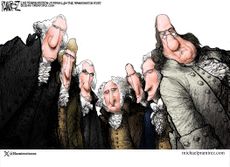Why conservatives don't like to talk about race
And why they should

Conservatives don't like to talk about race. And there are some very good reasons why.
The first is that the left constantly and spuriously plays the race card against the right. Conservatives spent decades saying that welfare hurt the very people it was supposed to help by disincentivizing work. They were accused of being racists for saying that — until conservatives passed welfare reform, which is now widely acknowledged as one of the most successful anti-poverty programs in recent decades. Conservatives spent decades saying that public housing hurt the very people it was supposed to help (and as someone who partially grew up in public housing, I can vouch for that) and that the best way to provide housing for all was to deregulate the sector. Conservatives were accused of being racists for saying that — even though the position is now widely accepted by the left.
This is the phenomenon called Krauthammer's Law — conservatives think people who disagree with them are wrong; liberals think people who disagree with them are evil; and as a conservative often on the receiving end, I can vouch for the fact that it is extremely frustrating.
Subscribe to The Week
Escape your echo chamber. Get the facts behind the news, plus analysis from multiple perspectives.

Sign up for The Week's Free Newsletters
From our morning news briefing to a weekly Good News Newsletter, get the best of The Week delivered directly to your inbox.
From our morning news briefing to a weekly Good News Newsletter, get the best of The Week delivered directly to your inbox.
The second reason that conservatives don't like to talk about race is that accusations of racism in public life can be extremely powerful, are basically impossible to disprove, and tend to be refereed by the national media, which is largely made up of progressives who tend to regard conservatives as guilty of ill will until proven otherwise. This combination makes those attacks extremely toxic, and accounts for much of the peculiar defensiveness of conservatives on race issues.
The third reason is that conservatives are suspicious of the overarching liberal narrative on race. Taxes, deficits, whether to go to war with country X or not — these are narrowly defined issues with widely accepted parameters. By contrast, some narratives about race make it the all-encompassing issue that has driven, drives, and will drive all public policy, and which can only be ameliorated through radical changes in the socio-political order. It doesn't have to be this way, but this tendency creates an impression in the minds of many conservatives that to buy even one piece of the narrative is to buy all the narrative.
There are also some bad reasons why conservatives don't like to talk about race.
Just because the left fits the story of racism within an all-encompassing narrative doesn't mean that the right has to choose between granting the point and selling its soul. For instance, it's enormously frustrating when the left calls attention to problem X, and proposes misguided public policy Y in response; and the right, instead of criticizing the misguided public policy and offering a better alternative, simply vociferously denies that X is a problem. We see this with the minimum wage and, paradigmatically, global warming. The right should be able to grant — as it does on its best days — that, yes, structural racism is a real thing — but the best way to combat it is through conservative public policy.
The second bad reason is what you might call insensitivity. Consider Barro's Law: "Conservatives so often get unfairly pounded on race because, so often, conservatives get fairly pounded on race."
Take one of our most dispiriting frequently reoccurring events: a black kid is shot by a white police officer. Often, the circumstances are murky. It's a Rorschach Test. Now, imagine two different people. The first, who is white, has only had positive interactions with the police, and police officers have always behaved courteously and professionally toward them. The second person, who is black, has had negative experiences with the police — experiences that the person has reason to believe were driven only by the color of their skin. The white person may naturally give the benefit of the doubt to the police officer, and the black person may not.
Now, we know that law-abiding black people's experiences with profiling are real. But is the white person's reaction "racist"? That toxic word is not the one I would use. A more sober assessment of the situation is simply that the first person has had a range of life experiences that make it harder for them to imagine that someone has had a different range of life experiences. Now, some on the left understand this, and this is why we get frequent calls for "a national conversation on race." To understand why that makes conservatives shudder and shriek, see my three good reasons above.
All of which is a very roundabout way of talking about the very sad case of the city of Ferguson, and how conservatives should deal with it.
From the start, liberal activists poisoned the well by trying to make a young man who had committed robbery the day he was shot the poster child for police racism and excessive violence. But it still remains the case that, as a recent Department of Justice report makes clear, Ferguson's police department routinely and unjustifiably behaved in an absolutely thuggish manner, and in a way that was largely race-inflected.
This is precisely why conservatives should care about this issue. Here we have not some grand narrative of oppression, but instead a very specific problem: bad policing. This is a problem conservatives care about, and should care about, because conservatives care about the rule of law (which should apply to everyone equally), because conservatives care about the Constitution, and because conservatives care about law and order. The last point is crucial — as any policing expert will tell you, the single worst thing that can happen for crime is for the police to lose the trust of the community they're supposed to police. The great revolution of community policing, largely promoted by the right, which cleaned up cities including New York, is not just about "broken windows" — it is also about police officers who are present on the beat and are trained to earn the trust of the community so that they will have the leads they need to solve crimes. Ferguson's problem was "worse than a crime, it was a blunder." The problem with racist cops isn't just that they're racist, it's that they suck as cops.
By and large, America has made tremendous progress on issues of race — legal discrimination, cultural discrimination, economic opportunity. But there are areas with much work to be done, and those areas where it is most urgent are also those that are right in the right's wheelhouse: issues of criminal justice reform, with the conservative war on prisons, issues of school choice, and finally issues of policing and law and order.
Time to go to work.
Sign up for Today's Best Articles in your inbox
A free daily email with the biggest news stories of the day – and the best features from TheWeek.com
Pascal-Emmanuel Gobry is a writer and fellow at the Ethics and Public Policy Center. His writing has appeared at Forbes, The Atlantic, First Things, Commentary Magazine, The Daily Beast, The Federalist, Quartz, and other places. He lives in Paris with his beloved wife and daughter.
-
 Today's political cartoons - November 12, 2024
Today's political cartoons - November 12, 2024Cartoons Tuesday's cartoons - judgemental looks, Europe's bumpy ride, and more
By The Week US Published
-
 Will Gary Lineker's departure be an own goal for the BBC?
Will Gary Lineker's departure be an own goal for the BBC?Today's Big Question Former star striker turned highest-paid presenter will leave Match of the Day after 25 years, with BBC head of sport reportedly declining to offer him a contract
By Harriet Marsden, The Week UK Published
-
 The potential impact of Trump tariffs for the UK
The potential impact of Trump tariffs for the UKUK goods exports to the US could be hit with tariffs of up to 20% seriously affecting the British economy
By Sorcha Bradley, The Week UK Published
-
 US election: who the billionaires are backing
US election: who the billionaires are backingThe Explainer More have endorsed Kamala Harris than Donald Trump, but among the 'ultra-rich' the split is more even
By Harriet Marsden, The Week UK Published
-
 US election: where things stand with one week to go
US election: where things stand with one week to goThe Explainer Harris' lead in the polls has been narrowing in Trump's favour, but her campaign remains 'cautiously optimistic'
By Harriet Marsden, The Week UK Published
-
 Is Trump okay?
Is Trump okay?Today's Big Question Former president's mental fitness and alleged cognitive decline firmly back in the spotlight after 'bizarre' town hall event
By Harriet Marsden, The Week UK Published
-
 The life and times of Kamala Harris
The life and times of Kamala HarrisThe Explainer The vice-president is narrowly leading the race to become the next US president. How did she get to where she is now?
By The Week UK Published
-
 Will 'weirdly civil' VP debate move dial in US election?
Will 'weirdly civil' VP debate move dial in US election?Today's Big Question 'Diametrically opposed' candidates showed 'a lot of commonality' on some issues, but offered competing visions for America's future and democracy
By Harriet Marsden, The Week UK Published
-
 1 of 6 'Trump Train' drivers liable in Biden bus blockade
1 of 6 'Trump Train' drivers liable in Biden bus blockadeSpeed Read Only one of the accused was found liable in the case concerning the deliberate slowing of a 2020 Biden campaign bus
By Peter Weber, The Week US Published
-
 How could J.D. Vance impact the special relationship?
How could J.D. Vance impact the special relationship?Today's Big Question Trump's hawkish pick for VP said UK is the first 'truly Islamist country' with a nuclear weapon
By Harriet Marsden, The Week UK Published
-
 Biden, Trump urge calm after assassination attempt
Biden, Trump urge calm after assassination attemptSpeed Reads A 20-year-old gunman grazed Trump's ear and fatally shot a rally attendee on Saturday
By Peter Weber, The Week US Published